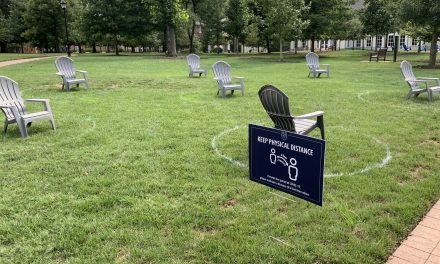Emory University will not declare itself a “sanctuary campus” but will continue supporting undocumented students, according to a Jan. 18 all-Emory email from Interim Provost and Executive Vice President for Academic Affairs Stuart Zola and Senior Vice President and Dean of Campus Life Ajay Nair.
The decision to not designate Emory as a sanctuary campus prompted Sanctuary Coalition at Emory, an organization that consists of undocumented students, student allies, faculty and staff, to call on University President Claire E. Sterk to sign a letter drafted by the Coalition. The Coalition letter contained a pledge to designate Emory a sanctuary campus and to enact three policies that would “demonstrate the University’s commitment” to the education and protection of its undocumented students.
The Jan. 18 email listed initiatives the University has started or completed to support undocumented students through statements of legal and administrative support, privacy rights, financial aid and dialogue.
Emory developed a Progress Report on the status of its actions to support its undocumented students. The report, according to Senior Director for Communications Tomika DePriest, was created from a Nov. 20 petition sent to administrators by students and community letters last fall, asking Emory to designate itself as a sanctuary campus.
“In their public statements, Emory University administrators have highlighted resources that already exist,” the Coalition wrote in a Jan. 18 Facebook post published after administrators sent the Jan. 18 email. “However, they have not declared policy changes that would better support undocumented students, now or in the future.”
The post included the Coalition’s letter, which urged Emory to pledge lawful non-cooperation with federal immigration authorities, admit all academically qualified undocumented students regardless of their immigration status and provide mental health services and pro-bono legal services to students with families of mixed documentation status.
The Coalition asked Sterk to sign the letter by her Feb. 8 inauguration as University president. The Coalition sent the letter to Sterk Jan. 18, according to Coalition member and College sophomore Ruben Diaz Vasquez. The Jan. 18 Facebook post states the coalition includes undocumented students, but Diaz Vasquez declined to confirm that statement.
Sterk is currently reviewing the letter and has not yet responded, Associate Vice President for Media Relations Nancy Seideman said Tuesday.
Emory’s decision and the Coalition’s letter came weeks after a Nov. 21, 2016, email from Sterk telling students that administrators had begun reviewing the petition calling for Emory to designate itself a “sanctuary campus.”
Sterk, Zola and Nair met with about half of the students at Emory they know of who have DACA status late last semester to discuss what the University ought to do to protect its undocumented students, Sterk told the Wheel in a Jan. 18 interview.
Students with DACA status hold a temporary, renewable immigration benefit that protects undocumented students from deportation and allows them to work legally in the U.S.
According to Sterk, DACA students told administrators they wanted to avoid drawing attention to Emory.
“[They said,] ‘Don’t draw attention to Emory because it creates more fear for us, makes it more difficult to come up with constructive solutions,’ ” Sterk said. “I made the decision as a person and as Emory’s president that was the best path to take — so that’s what we have done.”
Students in the Undocumented Students Association (USA), a group composed of less than 10 undocumented students and advised by Raoul Complex Director Lenet Rivas, also said they did not want Emory to be a sanctuary campus, Rivas said.
“There’s nothing that comes out of [the] sanctuary campus [designation] that [Emory doesn’t] already have or can’t build,” Rivas said. USA currently seeks to connect its members to other undocumented students and to provide them with legal and financial resources.
Rivas also cited the legal implications of such a designation, especially in Georgia, where state representatives threatened to revoke state funding from Emory or any institution that breaks the law to protect its undocumented students. Emory receives state funds including the Helping Outstanding Pupils Educationally (HOPE) scholarship and Tuition Equalization Grants, which are awarded to Georgia residents, according to the Atlanta Journal-Constitution.
When asked why the Coalition called for the University to be designated a sanctuary campus when some undocumented students wished for the opposite, Vasquez pointed the Wheel to the Coalition’s letter and declined to comment further.
“A sanctuary campus is a place where all students — documented and undocumented — may safely pursue higher learning without fear of discrimination or persecution,” the letter states. It calls Emory to recognize education as a human right and reaffirm its support of undocumented students.
The College Senate of Emory University’s College of Arts and Sciences endorsed the initial petition, Faculty Council of the University Senate member and Associate Professor of Russian Juliette Apkarian said in a Jan. 24 University Senate meeting.
Meanwhile, Georgia State Rep. Earl Ehrhart (R-Powder Springs) kept his promise to introduce legislation that would bar any private institution of higher education from receiving state funding should that institution break the law to protect its undocumented students. The bill HB 37 had its second reading Jan. 23.
Emory said it will follow federal and state law in its efforts to protect undocumented students and not release confidential student records unless under subpoena. The University “strongly supports” the BRIDGE Act, a bipartisan act that would introduce legislation to protect DACA recipients should Trump repeal DACA, as he promised during his campaign, according to the Jan. 18 email from Nair and Zola. Under the act, those with DACA status could apply for a “provisional protected status” if they pay a fine and consent to a background check. That status would protect them from deportation should DACA be repealed.
Emory’s decision not to designate itself a sanctuary campus came two days before the inauguration of President Donald J. Trump, who promised to repeal DACA.
Michelle Lou contributed reporting.
julia.munslow@emory.edu | Julia Munslow (18C) is from Coventry, R.I., majoring in English and creative writing. She joined the Wheel’s Board of Editors her freshman year as assistant arts & entertainment editor and served most recently as executive editor. This past summer, she covered national politics for Yahoo News. Her photos of the 2016 Trump chalkings protest won an SPJ Mark of Excellence for Breaking News Photography and were syndicated by national media organizations including The New York Times and Newsweek. In addition to the Wheel, she is an Interdisciplinary Exploration and Scholarship (IDEAS) Fellow, a member of Mortar Board and a member of Omicron Delta Kappa.




